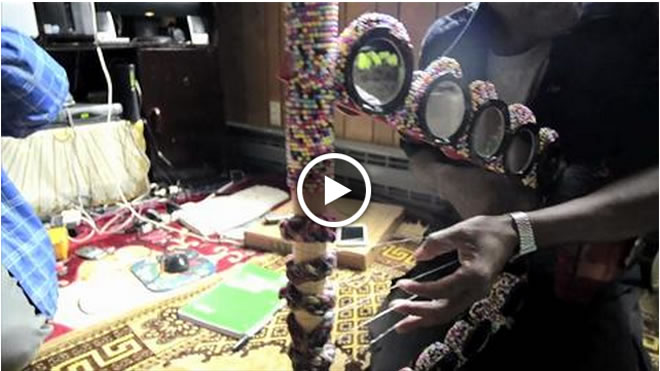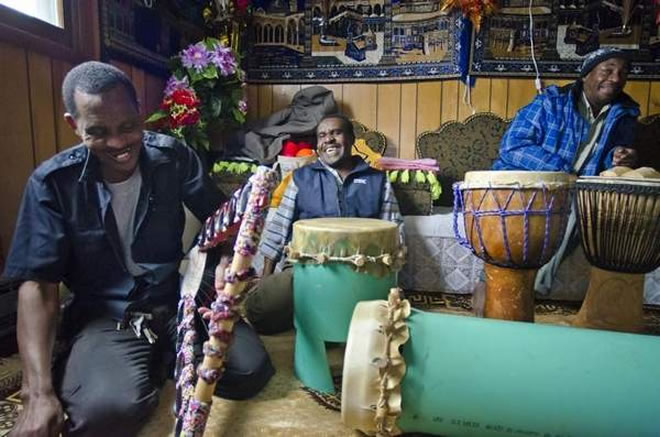
Walinja plays traditional Somali Bantu music.: Walinja, a group of Somali Bantus based in Burlington, travels around the country to perform traditional music.

Luke Whelan
Free Press Correspondent
Sunday, January 27, 2013
As Osman Hassan strikes a traditional Bantu “Zeer” drum, made from cowhide and blue PVC bought at Home Depot, he remembers the time he was shot. The details of the incident blur, but it happened in the midst of a warlord rampage during the Somalian Civil War in 1991. Today, he is sitting on the floor of a small apartment in Burlington, Vermont with his longtime friend and musical partner Mohamed Bulle, who strums the six strings of a sharrara, a triangular lyre instrument that resembles a guitar.
Bulle and Hassan are master Somali Bantu musicians and instrument makers, who learned their art from their village elders in Somalia when they were children. Through racial persecution, civil war, refugee camps, and relocation across the globe these two men have sustained their craft and their friendship. According to them, no other Somali Bantu musicians of their caliber exist in the United States, and therefore they have become immensely popular in refugee communities across the country.
Bulle and Hassan lead a music group with other Somali Bantus named Walinja (which means in Maay Maay — the language of most Somali Bantus — “coming together to make something”). Walinja will perform for the first time in front of a non-Somali Bantu audience at a concert that will be held on Saturday, Feb. 2 at St. Michael’s College’s McCarthy Recital Hall. A2VT, the popular Winooski-based rap group will open for them. One of the three members, Said Bulle, is Mohamed Bulle’s nephew.
Hassan — stocky, mustachioed and quick to laugh — and the lanky, reserved Bulle were both born in Somalia but are ethnically, culturally and linguistically distinct from the dominant, lighter-skinned tribes in Somalia. Their Bantu ancestors came to Somalia two centuries ago as slaves from what are now Tanzania and Mozambique. Ethnic persecution and economic, educational, and political marginalization carried out by the dominant Somali tribes continued against the Bantus living in Somalia through the twentieth century. In 1992, nearly 10,000 Bantus fled Somalia to neighboring countries like Kenya to avoid the violence of the Somali Civil War. In 1999, after failed attempts by the United Nations to relocate them within Africa, the United States agreed to take in 12,000 Somali Bantu refugees and resettle them in American cities.

Walinja, a group of Somali Bantu musicians playing traditional music, share a laugh in Burlington. From left to right are Mohamed Bulle, Osman 'Zuka' Hassan and Mustaf Lala. / GLENN RUSSELL/FREE PRESS
Communicating across cultural and language barriers
New Americans (immigrants, refugees and asylees) like the Somali Bantu are becoming an increasingly important part of communities throughout the United States, especially in Vermont. Judy Scott, director of the Vermont Refugee Resettlement Program, a field office of the U.S. Committee for Refugees and Immigrants, said her program first helped four Somali Bantu families comprising 19 people resettle in Chittenden County in 2003. But the community has grown to over 600 individuals since then according to the Vermont Somali Bantu Association. They have entered schools, rented apartments and gotten jobs. Both Bulle and Hassan work as custodians — Bulle at a corporation and Hassan at a shopping mall. But communicating their identity beyond their perceived status as refugees has proved challenging for many in the community who face language and cultural barriers. These two men do not speak English (they spoke through translators Mohamed Muktar and Mohamed Ahmed) but they hope to use the hypnotic riffs and rhythms of traditional Bantu music to convey their history and identity to their new neighbors in America.
Walinja plays a type of Bantu music that uses the sharrara’s five-note scale, the poly rhythms of several different kinds of drums, and call-and-response singing. It is meant to be danced to by both men and women. The repetitive, driving strumming, beating, and singing of this music could be misinterpreted as less sophisticated than the more “produced” Afro-music that has become popular in the U.S.
But Dr. William L. Ellis, an Assistant Professor of Music at Saint Michael's College and a blues musician disagrees. “I think the fact that Mr. Bulle is able to get all the sounds he can out of his Sharrara ... is amazing,” he said. “There is just a lot of complexity going on with simple strings and drums, and everybody contributes to a very complex, engaging whole ... they are able to communicate like any great Jazz ensemble or blue’s ensemble, or classical ensemble.”
Keeping the tradition alive
Greg Sharrow, PhD, co-director of the Vermont Folklife Center in Middlebury, Vermont also recognized their talent and the importance of preserving their music. “These guys are brilliant musicians, I mean they are just good,” said Sharrow.
Since 2009, he has helped Bulle and Hassan apply for funding from the Vermont Folklife Center Traditional Arts Apprenticeship Program to help them teach their music to younger generations who are quickly integrating into American life. The program is part of a national initiative run by the National Endowment of the Arts. It offers support to bring master artists and less-experienced apprentices together to pass down crafts that cannot easily be organically preserved in a rapidly changing world. (Find out more about the project here:http://bit.ly/YdrFiB).
Assimilation to American culture has hardly been the first obstacle for Hassan and Bulle’s efforts to sustain their musical tradition. Growing up with no access to education and relegated to farming and manual labor, music, which they both had a natural gift for, became an outlet for fun and joy. In fact, they first met drumming together when they were around eight or nine years old. When they grew older, they became the most popular wedding band in their region in the Juba River Valley, shuttling with their instruments from village to village in tiny rickshaw taxis.
Years later Hassan and Bulle moved with their families to refugee camps in Kenya when Somali warlords pillaged the area for resources and supplies during the civil war. They ended up in different camps. But when Hassan found out where Bulle was living, he moved there to join him, and they resumed playing music together. But they were separated again when Hassan moved with his family to Virginia in 2003 through the United State’s resettlement program. Bulle followed Hassan to the United States soon after in 2004, but ended up in Burlington, Vermont.
Again, when Hassan heard that Bulle was in Burlington, he moved his family to Winooski to be close to his friend once more. “We always remembered when we were young, when we were playing [music] together, [so when we were reunited again] we feel very good all of the time,” said Hassan.
Adjusting to new surroundings
Now that they are in America, instead of hollowed-out tree trunks, Bulle makes drums out of PVC. Instead of playing their music outside in the sun with plenty of room to dance, Bulle and Hassan play in Bulle’s modest, tapestry-lined living room to avoid the cold Vermont winter.
But the beauty of the instruments and the music has endured. “It’s very important because even my grandfather, my great grandfather used to do this, and there is no way we will leave [music]. Even if we get older and die, I know we will have people who are going to continue, that’s why it is important,” said Bulle.
Ritual celebration is an important part of Bantu culture, occurring multiple times a year for weddings, festivals, and other special occasions. So having Bulle and Hassan’s music has proved invaluable for displaced Somali Bantu communities all around the country. They have been invited to play everywhere from Lewiston, Maine to Seattle, Washington.
“I know deep inside that they love it,” said Hassan of Bulle and his music, “that’s why they invite us and they get excited before we even arrive.”
Reaching new audiences
Now, Bulle and Hassan are preparing to share their music and their culture with Vermonters outside the Somali-Bantu community. Ellis will be hosting Walinja as part of a new international music series he is organizing with St. Michael’s Diversity Coalition to “spotlight local talent and traditions from Burlington's new and emerging communities.”
“They are a world-class ensemble ... and we are really lucky to have them working here [in Burlington] and keeping their traditions alive,” Ellis said.
Bulle and Hassan are confident it will go well. “We feel very, very welcome in Vermont, that’s why we don’t move to another state,’ said Hassan.
Ellis also believes the performance will be a success. “Even if you don’t understand the language or the context, you get it on a certain fundamental level,” he said. “Good music translates, there is no translation needed when the music is that good.”
The evening will also mark the first time Mohamed Bulle has shared the stage with his nephew Said Bulle, or even heard his music. And Said Bulle has not seen his uncle or Hassan play music since leaving Somalia. But he is proud of his uncle for preserving Somali Bantu culture and finding ways to bring the community together. “I wish my uncle luck and I hope he wishes me luck. I’m excited to see him on stage and [playing music] in America like he used to do in Somalia,” he said.
While Mohamed Bulle and Hassan look forward to the concert, they are mostly just happy for an excuse to play their music. Hassan says with a big grin that when they play, they feel a “very big, big happiness inside, that’s why we continue and don’t even get tired of it.”